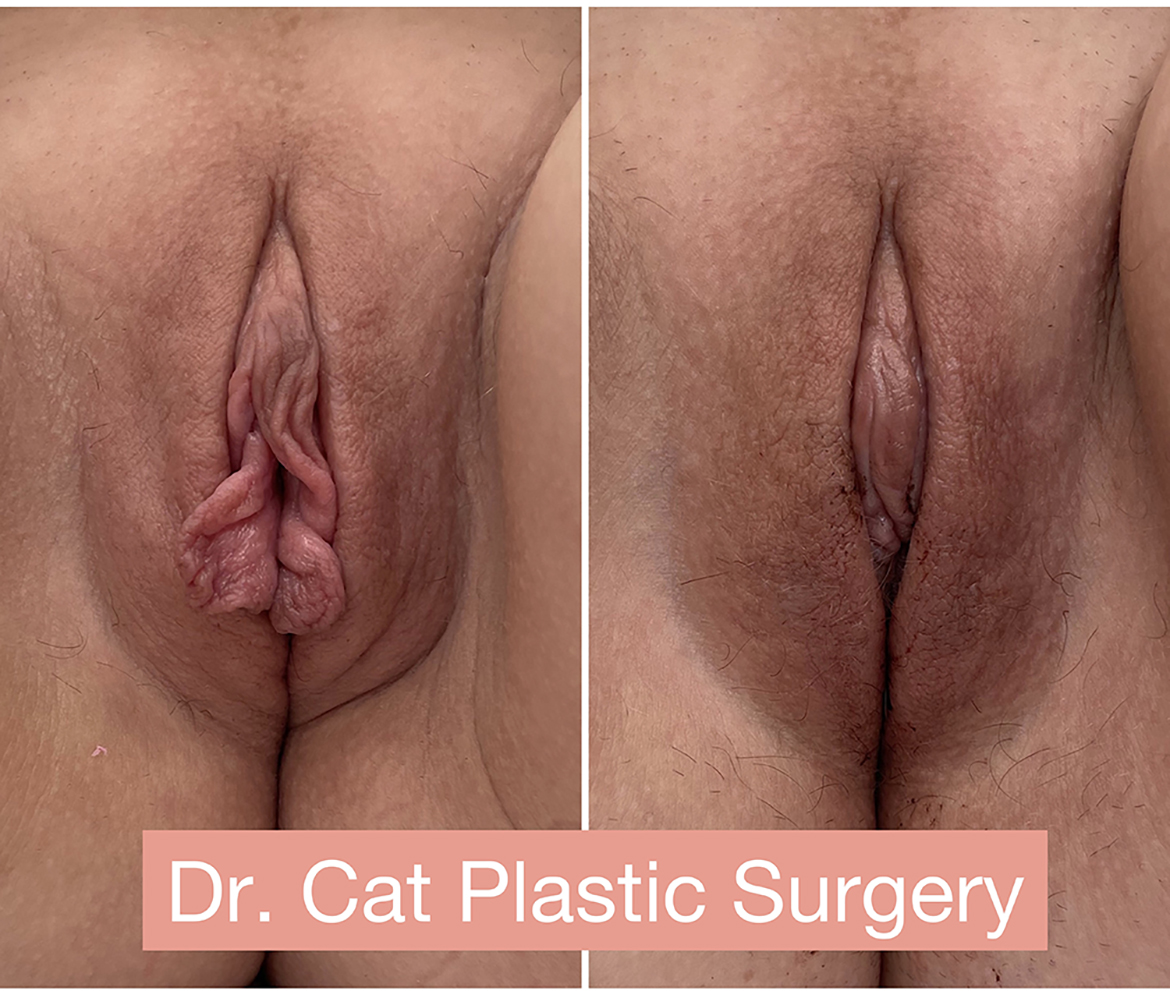Understanding Loose Labia and Vaginal Laxity
As women, our bodies are capable of amazing things, from puberty to pregnancy to childbirth. It’s no secret that these events dramatically alter the female anatomy. Not always openly discussed, many women silently struggle with sensitive health issues like loose labia and vaginal laxity.
Women of all shapes, sizes, and backgrounds confide in Dr. Cat for help with vaginal health issues. Not only are many experiencing physical discomfort like irritation, odor, or pain during intercourse and everyday activities, but there’s often an equally significant emotional toll.
We know how challenging it can be to discuss these issues, let alone seek help. However, if vaginal laxity is impacting your self-esteem and quality of life, Dr. Cat affirms you don’t have to suffer in silence or feel ashamed.
“I’ve dedicated my career to having open conversations about vaginal surgeries and rejuvenation to dispel any social taboos and empower women to seek procedures that make them more confident and comfortable every day of their life.”
In this article, Dr. Cat shares her extensive experience in vaginal rejuvenation to help you reclaim your confidence and live a life of fulfillment.
Join us as we openly discuss factors contributing to vaginal laxity, surgical and non-surgical solutions, and expert advice for maintaining vaginal health.
Causes of Loose Labia and Vaginal Laxity
While vaginal laxity and loose labia can impact anyone, certain events or life stages can increase their likelihood. These events can contribute to weakening the muscles and tissues in your pelvic floor, leading to various health symptoms.
To help you better understand these factors, let’s take a look at the most prevalent causes of loose labia and vaginal laxity:
- Pregnancy and childbirth: The stretching and tearing of vaginal tissues cause the labia to loosen and the vaginal walls to become less firm.
- Aging: As women age, the skin and tissues of the vulva and vagina often become less elastic, losing their tone.
- Hormonal changes: A drop in estrogen levels during menopause can lead to decreased vaginal lubrication and a loss of tissue elasticity.
- Genetics: Some women are simply predisposed to developing loose labia and vaginal laxity because of their genetic makeup.
- Weight fluctuations: Rapid weight loss or gain can impact the elasticity of the skin and tissues in your vaginal area.
- Certain medical conditions: Some medical conditions (like Ehlers-Danlos syndrome or connective tissue disorders) can increase your chances of vaginal laxity.
Symptoms of Vaginal Laxity and Loose Labia
Even though the root of these intimate issues differs, they’re often accompanied by a range of general side effects, such as:
- Discomfort or irritation: caused by labial tissue rubbing against clothing. In some cases, it may cause rashes or infections.
- Pain during intercourse: Vaginal laxity can cause discomfort and pain during sexual intercourse, which can affect sexual pleasure and intimacy.
- Urinary incontinence: Weak pelvic floor muscles can lead to urinary incontinence, or involuntary urine leakage.
- Decreased sexual satisfaction: Vaginal laxity can decrease sexual pleasure for both partners, as it can reduce friction and sensitivity during intercourse.
- Loss of confidence: Sensitive feminine health issues can negatively impact a woman’s confidence and self-esteem, leading to feelings of embarrassment or shame.
If any of this resonates with you, remember that these issues are more common than you think. We’re on a mission to empower women to reclaim control over their vaginal and feminine health. With the right education, resources, and care team in your corner, you can regain confidence and intimacy.
There are a range of safe and effective options available for rejuvenating your vaginal health and restoring your sense of self.
Benefits of Vaginal Rejuvenation
Vaginal rejuvenation is more of an umbrella term than a singular procedure. It describes any treatment for improving vaginal tightening, urinary incontinence, and the overall appearance of a loose labia minora (inner folds of the vulva) or labia majora (outer folds of the vulva).
Dr. Cat says it’s a common misconception that women pursue vaginal rejuvenation purely for vanity. With many women feeling self-conscious or experiencing reduced quality of life, seeking treatment is about improving overall wellness and confidence.
You do not have to suffer in silence, and you deserve to love every inch of your body. For many women like you, getting a designer vagina from a trusted, experienced surgeon is the first step.
- Increased confidence and quality of life
- Enhanced sexual experiences
- Resolved bladder incontinence
- Relief from pain or discomfort
- Improved appearance of the vaginal area
Even with all these advantages, we understand that the thought of undergoing surgery down there can be nerve-racking. But Dr. Cat’s patients often share that it’s the “easiest, most rewarding decision they’ve made for themselves.”
Medical Treatments for Loose Labia and Vaginal Laxity
Let’s take a closer look at world-renowned plastic surgeon Dr. Cat’s life-changing surgical approach to addressing vaginal laxity and loose labia.
Labiaplasty
Labiaplasty (or labial reduction) is a plastic surgery procedure in which Dr. Cat removes excess labia minora, reshaping it through her exclusive technique. It also removes the dark wrinkled skin from the labia edge.
Each procedure is tailored to you and your desired outcome. For instance, one patient may have loose labia that must be resected (or cut). Whereas another patient may require a clitoral hood reduction (removal of the excess skin over the clitoris), as well.
“For the most natural appearance, I’ve developed a special technique that creates a natural-looking, tucked-in symmetric shape with a nearly invisible scar. The transformative results of these procedures speak for themselves.”
The entire surgery takes between two to four hours, with many patients going home shortly after. Those without caretakers recover overnight on-site.
Recovery varies from patient to patient. You’ll generally return to normal (sex, exercise, tampon use, and tight clothing) in four short weeks. In about three to four months, you’re fully healed. As they heal, most patients say they experience minimal pain and soreness.
Dr. Cat emphasizes that results, however, depend highly on your surgeon.
“This procedure requires meticulous technical skill, artistry, and experience.”
She warns that one quick Google search and your palms may start sweating at the horror stories you come across — severe pain, bleeding, as well as sensation issues, and all kinds of complications.
Rest assured that a qualified, experienced, trustworthy surgeon will always put you and your health first.
That’s why Dr. Cat takes such careful measures to protect her patients.
“I’ve developed my labiaplasty surgery technique so patients experience little to no pain, as well as a quick and easy recovery with minimal to no scarring.”
Dr. Cat often pairs labiaplasty with her exclusive non-surgical rejuvenation procedure, ThermiVa.
ThermiVa
Prefer a vaginal rejuvenation procedure with zero downtime?
ThermiVa is a non-invasive, painless procedure that uses radiofrequency technology to improve vaginal laxity and promote collagen synthesis.
Dr. Cat transmits active radio frequencies to the patient’s vaginal tissues on a cellular level using a small wand. Since there’s no pain or downtime, there’s no anesthesia, and you can return to normal life as soon as the treatment is completed. In fact, it’s often compared to a “hot stone massage.”
A full treatment consists of three sessions, but patients (including Dr. Cat, herself) often opt for “maintenance sessions” two to three times yearly.
She highlights its benefits, sharing that “ThermiVa helps with the overall wrinkling of the tissues externally and internally tightening the vagina. Since it also increases blood flow to the tissues, studies show that patients report an increase in the number and intensity of their orgasms.”
However, like labiaplasty (and any surgical or cosmetic procedure), technique matters. Dr. Cat cautions that results are very technically dependent, as tissues need to be treated in a particular way.
“I’ve had some patients visit other places or medspas and express how unhappy they were with their results. That’s why I do all ThermiVA treatments myself — to ensure patients get the same life-changing, dramatic results I do.”
Reduced vaginal laxity, sky-high confidence, and pleasure boost with no downtime? It’s no wonder Dr. Cat is a longtime ThermiVa fan herself.
Wondering Which Procedure is Right for You?
When it comes to narrowing down which approach is best, Dr. Cat says it starts with open and honest communication.
“I start every consultation by asking the patient what specifically is bothering them and what they want to achieve. Then, we review their anatomy together, and I develop a customized plan.”
Choosing a surgeon who is experienced in vaginal rejuvenation and compassionate about such an intimate topic, like Dr. Cat, will ensure you receive a personalized approach to achieving your desired results.
What else can you do to prevent vaginal laxity and loose labia?
Dr. Cat’s Tips for Maintaining Vaginal Health
“There are many devices on the market that try to tighten the tissues, but the one I’ve found the most effective is ThermiVa,” explains Dr. Cat.
That said, if you’re looking for ways to enhance vaginal health at home, here are some tips you can put to practice:
- Pelvic floor exercises: Also known as kegels, this consists of contracting and relaxing your pelvic floor muscles to improve vaginal tightening and prevent vaginal laxity.
- Healthy diet: A balanced diet rich in nutrients like vitamins A, C, and D, as well as zinc and probiotics, supports vaginal health.
- Staying hydrated: Proper hydration helps prevent vaginal dryness, which can lead to irritation or discomfort.
- Avoid tight clothing: Tight clothing often irritates your vaginal area, causing friction that can contribute to vaginal laxity.
- Avoid excessive douching: Douching disrupts your vagina’s natural balance of bacteria, increasing your risk of infection and irritation.
- Practice safe sex: Using condoms and practicing good hygiene during sexual activity helps prevent the spread of sexually transmitted infections, promoting overall vaginal health.
Incorporating these small, proactive steps toward your feminine health will help you feel more confident, comfortable, and empowered in your skin — something every woman deserves.
Awaken Your Divine Feminine with Dr. Cat
The feminine body is a powerful being, so why do we still feel societal pressure to keep quiet about issues like vaginal laxity and loose labia?
We bear children, lead nations, create art, innovate, save lives, and raise families — and amidst these accomplishments, our bodies react naturally.
At Dr. Cat Plastic Surgery, we treat your feminine issues and concerns with the utmost care, discretion, and sensitivity.
As a pioneer in vaginal rejuvenation, Dr. Cat has seen firsthand the transformative power of taking control of your intimate health. She has helped countless women regain their confidence and experience greater pleasure and intimacy through her exclusive, personalized approach to vaginal rejuvenation.
You deserve to feel empowered, confident, and beautiful in your own body.
Book a consultation with us now and take the first step toward rediscovering your feminine power.


